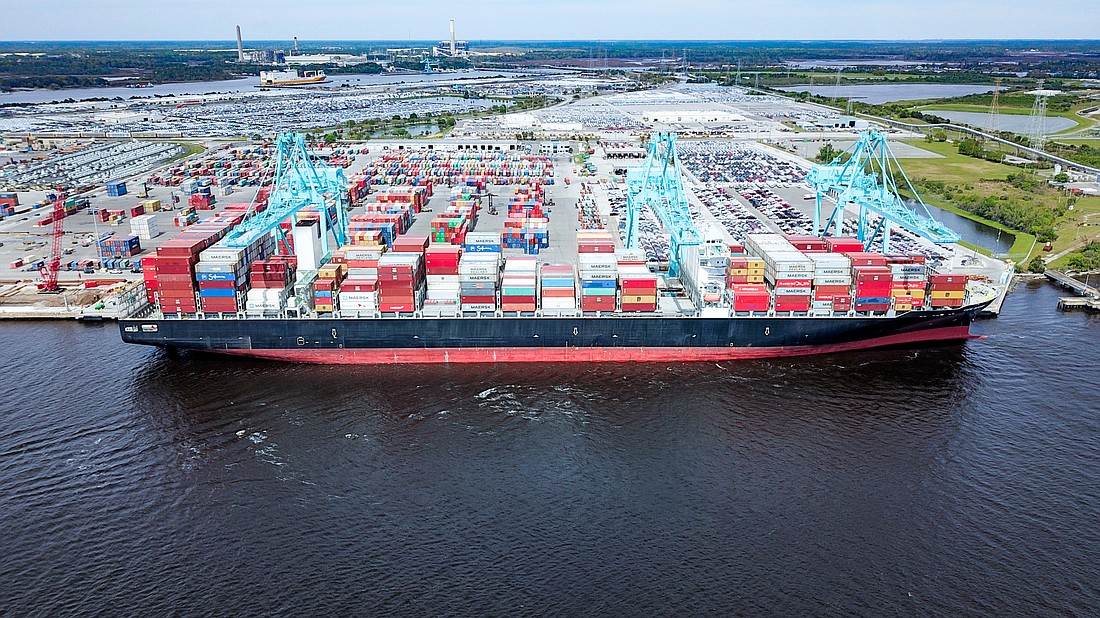
The Jacksonville Port Authority saw a 14% drop in budgeted container volume coming through its terminals in March and a 21% drop in automobile units as global COVID-19 quarantines restricted supply chains.
JaxPort Director and General Manager of Business Development Robert Peek said April 13 that another 15% to 20% drop in projected volumes will continue into April, as shelter-in-place orders in the U.S. impact domestic demand for consumer goods and automobiles.
Nearly one-third of JaxPort’s container shipping business comes from Asian markets — 10% from China.
Peek said an annual drop in February volumes linked to the Lunar New Year slowdown in Asian manufacturing and production carried into March as factories and exporters remained closed because of COVID-19 quarantines.
Peek said the global supply decline is causing similar container volume declines in nearly every major U.S. seaport.
“They haven’t fully reported their March numbers, but the business intelligence we have is a number of ports will be in that neighborhood — 15% to 20% down for March,” Peek said.
March volume drops were less than projected. Peek told JaxPort board members during its March 9 meeting to expect a 20% decline from budgeted container volume.
Many Asian manufacturers have restarted production, Peek said. But COVID-19 social distancing mandates that didn’t begin in the U.S. until mid- to-late-March will lower domestic consumer demand and cause the April volume decline.
Beyond April and May, Peek said it is difficult to predict how the virus will continue to impact JaxPort.
“There’s so much uncertainty around when the economy will open back up,” Peek said.
The port official said automobile units coming into JaxPort will see a “dramatic decline” in May.
“We know that on the auto side, like all auto ports in the U.S., volumes are going to be down for at least a couple of months. Just about all the new car production in the world is shut down,” Peek said. “The auto factories in Asia and Europe were shutting down by the middle of March.”
Major U.S. automakers shut down factories before the end of March, and Peek said there it’s unclear what domestic consumer demand for new cars and trucks will immediately return after the economy reopens.
Despite the drop in volume, Peek said COVID-19 has not impacted day-to-day operations at JaxPort’s terminals.
Essential employees at the companies that lease space at JaxPort are still on site to load and receive cargo.
JaxPort has about 150 employees and Peek said administrative workers who can work remotely are.
“As long as we have cargo coming in, we need staff to handle the cargo,” JaxPort Public Information Officer Chelsea Kavanagh said in a follow-up email April 13. “If cargo volumes drop off, we have plans in place to respond. To date, we have implemented a hiring freeze and have tasked all departments to reduce expenses where possible.”
Kavanagh said port officials are reducing costs and finding alternative sources of revenue to limit the impact on JaxPort.
Despite a drop in container volumes in March, Kavanagh said revenue held steady.
“We do anticipate seeing a sharper revenue impact in April, May and June,” she said. “The extent of that impact is still to be determined. We are working closely with our ocean carriers and tenants to monitor the situation and prepare.”
About 56% of JaxPort’s container business comes from Puerto Rico, one-third from Asia and the balance is the rest of the world.
Kavanagh said diversification played a role in reducing the revenue loss from COVID-19’s impact on global markets in March.
“For example, a large U.S. military cargo move took place in March, which helped offset some of the drop in commercial cargo volumes,” she said.
Peek said JaxPort has seen an increase in demand for its forest products business. This includes wood pulp used in the production of paperboard for packaging and toilet and tissue papers — all items in high consumer demand since the onset of coronavirus.